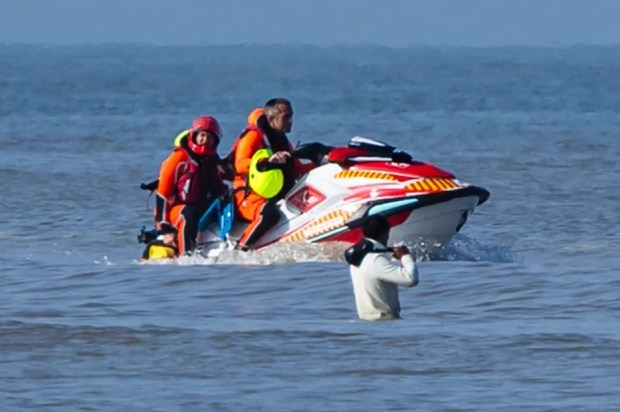In a covert operation, French police have begun employing jet skis to deploy nets in the sea, aiming to halt migrant boats attempting to reach Britain. This innovative tactic involves using netting to entangle a dinghy’s propeller, effectively bringing the vessel to a safe stop in shallow waters.
The trial, which included police wading into the water to puncture a migrant boat with a knife, comes just ahead of a state visit by French President Emmanuel Macron. During his visit, Macron is expected to announce new strategies allowing law enforcement to intercept boats in shallow waters at a summit with Sir Keir Starmer on Thursday. These measures are anticipated to be implemented within weeks, ultimately becoming a routine task for officers.
Home Secretary Yvette Cooper commented on the development, stating, “Over the last few months, we have been working together on new ways to crack down on the criminal gang operations, with the French now bringing in important new tactics to stop boats that are in the water. We need to stop at nothing to boost our border security.”
Background and Previous Efforts
The idea of using jet skis to intercept boats is not entirely new. The Tories had initially considered this approach in 2021, but the plan to spin boats back to France was deemed too hazardous. Other unconventional ideas from previous years included the use of wave machines, a floating “wall” in the Channel, and relocating migrants to decommissioned oil platforms.
Despite the ongoing efforts and the £500 million allocated to France to curb crossings, the number of people arriving in the UK by small boats this year has surpassed 20,000. This figure underscores the relentless pressure on both countries to find effective solutions to the migrant crisis.
Current Challenges and Future Plans
While the French have intensified their methods, boats continue to set sail for Dover. The situation is further complicated by the need for a comprehensive agreement on the return of migrants. A potential “one in, one out” scheme is under negotiation, which could allow Channel migrants to be sent back to France in exchange for asylum seekers with family ties in the UK.
Yvette Cooper is also exploring measures to tackle illegal work, following French claims that the UK’s black market economy serves as a magnet for migrants. These discussions are part of broader efforts to enhance border security and reduce illegal crossings.
Implications and Expert Opinions
Experts argue that while these tactics may provide short-term relief, they do not address the root causes of migration. Dr. Emily Jones, a migration policy analyst, noted, “The focus on deterrence overlooks the complex socio-economic factors driving migration. Long-term solutions require international cooperation and addressing the conditions that compel people to leave their homes.”
As the UK and France continue to grapple with this issue, the upcoming summit between Macron and Starmer could prove pivotal in shaping future policies. The discussions are expected to cover a range of topics, including enhanced cooperation and the potential for new bilateral agreements.
Meanwhile, the humanitarian aspect remains a critical consideration. Organizations advocating for migrant rights emphasize the need for humane treatment and the protection of vulnerable individuals seeking asylum.
As these developments unfold, the international community will be closely watching the outcomes of the Franco-British summit and the effectiveness of the new tactics in managing migration across the Channel.
 French Police Use Jet Skis to Halt Migrant Boats with New Tactics
French Police Use Jet Skis to Halt Migrant Boats with New Tactics French Police Use Jet Skis to Combat Migrant Crossings to Britain
French Police Use Jet Skis to Combat Migrant Crossings to Britain French Police Use Jet Skis to Halt Migrant Boats with New Tactics
French Police Use Jet Skis to Halt Migrant Boats with New Tactics Scottish Couple’s Tragic Loss Highlights Dangers of Tick-Borne Disease
Scottish Couple’s Tragic Loss Highlights Dangers of Tick-Borne Disease Exploring Identity Through Philosophy: A Review of Alexander Douglas’s Work
Exploring Identity Through Philosophy: A Review of Alexander Douglas’s Work